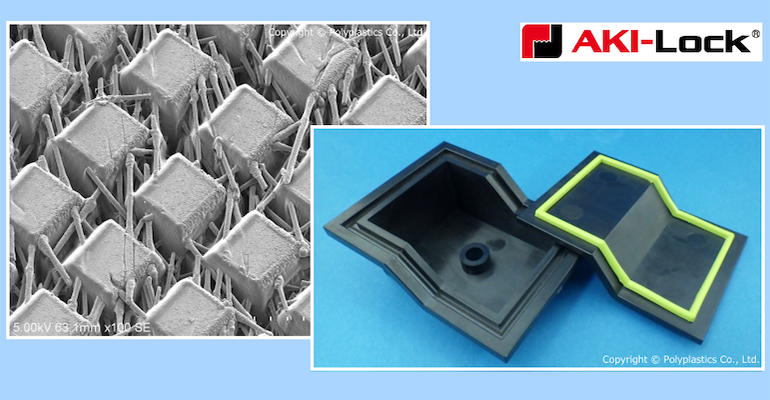
Japanese Firms Develop Innovative Bonding Processes for Plastics

Japanese engineering plastics supplier Polyplastics has introduced an innovative plastics bonding technology that is said to be unlike traditional joining methods such as welding or adhesion. AKI-Lock technology uses the glass fibers in composite materials as a physical anchor for bonding and has few restrictions on the materials that can be combined. It forms strong, airtight bonds with combinations of different materials for which bonding previously had been difficult.
“AKI-Lock opens the door to a broad range of new product development possibilities. The bonding technology meets increased market demand for weight reduction to address sustainable development goals (SDGs), reduces the number of parts, and provides stable adhesive strength and longevity,” said Polyplastics in a statement.
AKI-Lock technology uses laser irradiation to ablate the matrix resin covering the glass fibers and create a grid pattern, thereby forming physical anchors for bonding. Strong bonds can then be achieved by injecting the resin to be bonded over these anchors.
Physical anchors erase time constraints between treatment and bonding
Since the bond is formed by physical anchors, there is no time limitation between laser treatment and bonding. Further, masking is unnecessary since specific areas can be identified and targeted for laser irradiation. There is no need for an etching solution to roughen the surface and no waste liquids or materials are produced.
Airtightness of the bond is greatly enhanced because of three factors:
- The effect of resin entering and filling the gaps between the glass fibers;
- deformation in the grooves of the primary material by shear flow force of the secondary material;
- crimping from mold shrinkage of the secondary material.
“AKI-Lock helps to reduce assembly work and the number of components, thus lowering overall cost. The joining system also helps to reduce environmental impact through the use of dry processes, including the elimination of adhesives,” said Polyplastics.
Surface treatment of aluminum enables chemical bonding
Separately, Japan’s Showa Denko (SDK) has been awarded key patents in its home country for technology to directly bond aluminum alloys and polycarbonate resin without using an adhesive. SDK’s technique relies on surface treatment and primer treatment for the aluminum, realizing chemical bonding power. As an amorphous resin, polycarbonate is thought to be unsuitable for joining processes based on mechanical roughing of the aluminum surface followed by overmolding alone. SDK’s process adds chemical bonding power to mechanical bonding power and intermolecular force.
SDK is in the process of applying for worldwide patents and intends to deploy the technology in the automotive sector. Plans call for development of similar joining technologies for other amorphous engineering plastics.

Leave a Reply